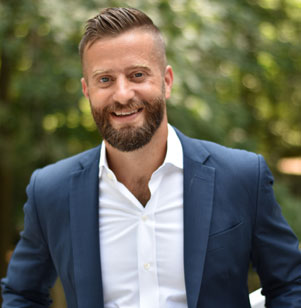Christian Union New York
&feature=youtuCrises have a way of exposing who we really are. But they also have a way of calling us forward to who God is making us to be.
On June 9, 2020, CU New York hosted author and lawyer, Justin Whitmel Earley for a virtual forum, Spiritual Rhythms in Times of Crisis. Our nation is facing widespread uncertainty and unrest, as many of our worlds have been turned upside down during the COVID-19 pandemic and our communities are shaken and challenged by the brokenness of deep-rooted racism and injustice. There is no doubt that our nation is in a time of crisis – but what impact does this have on our churches, communities and personal faith walks? Justin’s presentation draws from theology, personal testimony, historical novels and psychological study to dive into the nature of trials, the impact of habits on spirituality, and the hope of Jesus to bring redemption to all areas of brokenness.
Justin began his talk with a well-known scripture in Romans, demonstrating a biblical understanding of the purposes of trials.
Romans 5:1-5
5 Therefore, since we have been justified by faith, we have peace with God through our Lord Jesus Christ. 2 Through him we have also obtained access by faith into this grace in which we stand, and we rejoice in hope of the glory of God. 3 Not only that, but we rejoice in our sufferings, knowing that suffering produces endurance, 4 and endurance produces character, and character produces hope, 5 and hope does not put us to shame, because God’s love has been poured into our hearts through the Holy Spirit who has been given to us.
As Christians, we trust that our trials are not in vain because God can use these times of suffering to refine our character and to reveal a greater understanding of the hope we have in Him. The bible presents many examples of how to show compassion, service, and integrity in times of suffering, such as what we see in the stories of Paul, Job, Daniel and of course, Jesus. In Matthew 16:24, “Jesus told his disciples, “If anyone would come after me, let him deny himself and take up his cross and follow me.” A relationship with Christ does not promise us an absence of suffering in our lives, but rather we are told the contrary from the very start – there will be suffering in our faith walks. The gospel does however reveal the protection, provision and comfort of God’s presence and authority and is a promise of his total healing and redemption.
Although, Christians share this theological understanding, we sometimes forget this truth, distracted and consumed by our circumstances. Justin spoke vulnerably about a time in his life in which he found himself fixated on idols of work, productivity and affirmation from others. During this season, he developed intense anxiety and panic attacks that impacted his ability to sleep. Despite his background in missionary work and having a very committed relationship with Christ, he fell into worldly patterns of life. Justin made the powerful statement “How was it that the missionary become converted? …. Habit”.
Justin went into great depth throughout his presentation on the power of habit in our lives. Habits make up 40% or more of our daily actions. They impact our identity formation and our habits activate the deepest parts of our brains. Justin described habits as a form of liturgy – an analogy he recognized may initially be off-putting to many. Liturgy he defined as, patterns of words and actions in the form of worship so as to form us in the shape of what we worship. The point – many of our daily habits become a form of worship, and consequently we become what we focus on.
Justin described a key habit shift in his own life that helped center the attention of his heart more fully on the Lord. During the peak of his anxious, work-centered season, he checked his phone and emails first thing in the morning, as he sought to please his superiors in London by minimizing the impacts of the time zone difference between them. Now, Justin doesn’t check his phone first thing in the morning (although he admits that he slips up on some mornings when he’s tired or has an important deadline coming up).
He is also committed to turning his phone off for an hour each day and scheduling in at least an hour of meaningful conversation each week with others. These seemingly small changes have improved his relationship with God and his mental health. In recognizing that there is a battle going on for influence over his mind and heart between his work, the alerts on his phone, and God, Justin intentionally has been changing his daily habits to prioritize his relationship with God and in obedience of God’s mandate to seek community with others.
Justin’s presentation evokes a sense of introspection about our own habits and the spiritual rhythms of our faith walks. What actions do we each need to take in our own lives to prioritize Jesus?
What habits do we currently have and who or what do they reflect we are actually worshipping? Furthermore, with our walks intentionally centered on Christ through spiritual habits, how do we engage culture, our communities and the very real crises of today in a way that reflects the heart of Christ and his calling to the Church? As we recognize our personal and societal weaknesses, how do we intentionally invite Jesus to heal those areas of brokenness to partner with Him in His redemptive work?
Many crises seem impossible to work through or to resolve, many of which often feel far beyond our own control. By trusting God in His omnipotence to work through our suffering, and committing ourselves to intentionally prioritize our focus on our relationship with Him, we are promised as we read in Romans, that we will grow in endurance, grow in character to be more like Christ and that we will have a renewed hope in Him and his promises.
About the Speaker
 Justin Whitmel Earley is a lawyer, author and speaker from Richmond, VA. He graduated from the University of Virginia with a degree in English Literature before spending four years in Shanghai, China teaching and writing. He received his Law Degree from the Georgetown University Law Center and he now runs his own law practice in Richmond, Virginia at Earley Legal Group. His book, The Common Rule: Habits of Purpose for and Age of Distraction was published by InterVarsity Press in 2019.
Justin Whitmel Earley is a lawyer, author and speaker from Richmond, VA. He graduated from the University of Virginia with a degree in English Literature before spending four years in Shanghai, China teaching and writing. He received his Law Degree from the Georgetown University Law Center and he now runs his own law practice in Richmond, Virginia at Earley Legal Group. His book, The Common Rule: Habits of Purpose for and Age of Distraction was published by InterVarsity Press in 2019.
He frequently speaks at businesses, churches and conferences on habits, technology and mental health. Justin lives with his wife and four sons in Richmond, VA.


